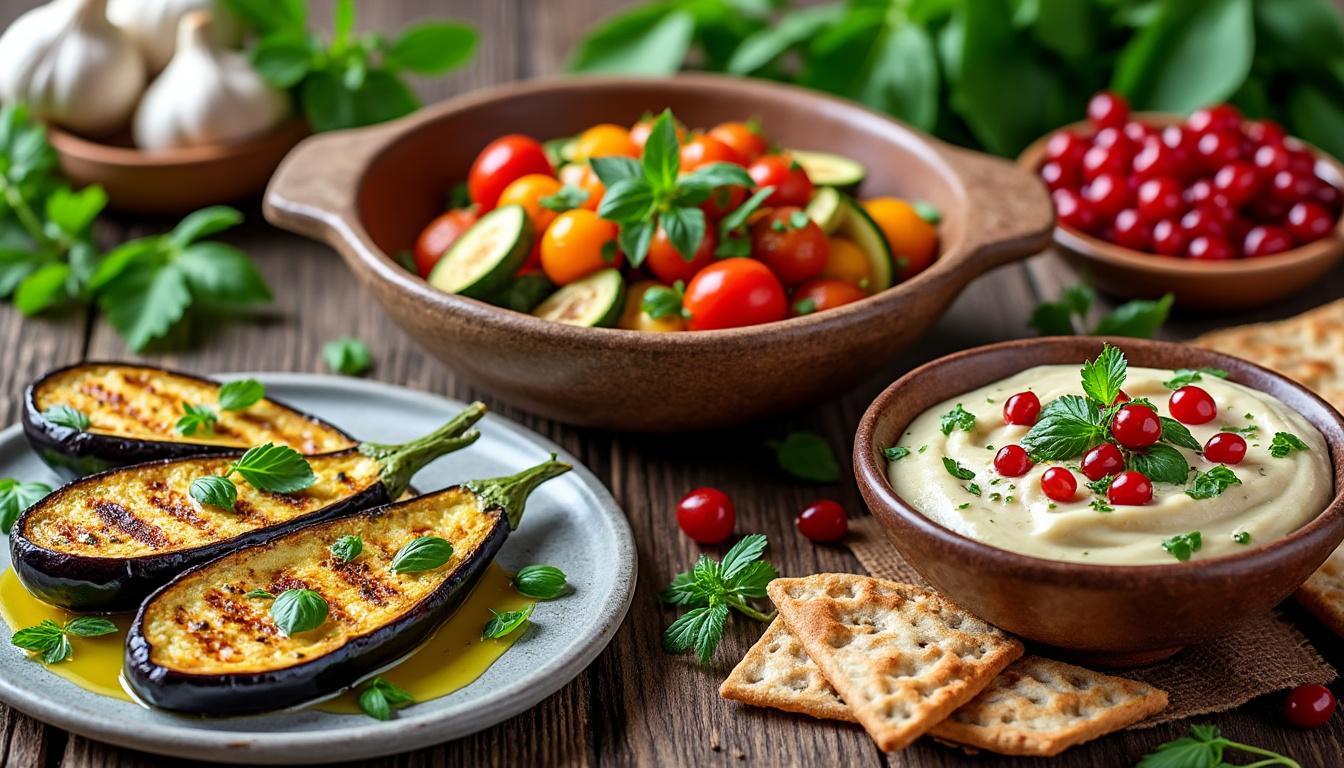Delicious Ways to Cook Eggplant: Quick techniques and recipes to master eggplant at home — grill, roast, fry, bake, and chef secrets for tender, smoky results.
Delicious Ways to Cook Eggplant offers a practical guide to turn an intimidating fruit-turned-vegetable into standout meals. Short, magazine-style paragraphs highlight techniques, global recipes and pantry-friendly adaptations. The piece follows a single culinary thread: Alex Harper, a small-restaurant entrepreneur, tests methods and scales them for home cooks and weeknight service.
Delicious Ways to Cook Eggplant: Essential Techniques for Every Home Cook
Mastering how to cook eggplant starts with understanding texture and water content. Alex Harper’s first discovery was that salt, air and heat control bitterness and sogginess. This section breaks down five methods that transform eggplant into tender, smoky or crispy results depending on the goal.
- Grilling: Slice lengthwise, brush with oil, char over high heat for a smoky finish.
- Roasting: Halve and roast at 220°C for concentrated umami and creamy flesh.
- Sautéing: Cube and sear to develop caramelized edges, then finish in sauce.
- Frying or Air Fryer: For crispness, bread or toss with a little cornstarch before frying or using an air fryer basket.
- Steaming and Microwaving: Fast, low-fat options that preserve tenderness for mash and dips.
| Technique | Best For | Time |
|---|---|---|
| Grilling | Salads, sandwiches, smoky mains | 8–12 min |
| Roasting | Purees, moussaka-style dishes | 30–45 min |
| Sautéing | Stir-fries, quick bowls | 10–18 min |
Alex kept a simple rule: match the technique to the final texture. That insight prevents common errors and ensures repeatable success.
Delicious Ways to Cook Eggplant: Quick Recipes for Weeknights
Home cooks need speed without sacrificing flavor. These quick recipes use pantry staples and require little active time. The goal: make weeknight cooking feel elevated and reliable.
- Sweet-Soy Eggplant Stir-Fry: Cube, sauté 10 minutes, simmer in honey-soy sauce; serve with rice or noodles.
- Air-Fryer Eggplant Rounds: Air-fry then bake briefly in tomato sauce topped with melted cheese.
- Simple Baba-Style Purée: Roast, smash with garlic and lemon for a dip served with pita or crudités.
| Recipe | Prep | Cook | Serve |
|---|---|---|---|
| Sweet-Soy Stir-Fry | 10 min | 18 min | Rice or noodles |
| Air-Fryer Rounds | 20 min | 45 min | With salad or pasta |
| Roasted Purée | 25 min | 25–30 min | Appetizer or spread |
For inspiration, consult trusted recipe sites like Bon Appétit, Serious Eats, and Food Network to adapt quantities or sauces; these sources often chart small test variations that speed learning. A concise takeaway: a 20-minute prep window yields satisfying dinners when techniques are consistent.
Delicious Ways to Cook Eggplant: Global Dishes and Flavor Pairings
Eggplant travels well across cuisines—Mediterranean, Middle Eastern, Indian and East Asian preparations showcase different textures and spice palettes. Alex adapted three international ideas to a small-kitchen workflow, keeping mise en place minimal and flavors bold.
- Provençal Aubergine: Roast or pan-roast, top with tomato sauce and gruyère for a gratin-style dish.
- Greek Moussaka (Vegetarian): Use textured vegetable protein (PVT) for a hearty layer, bake until golden.
- Indian-Style Eggplant Compote: Grill, then simmer with tomato paste and Madras curry—serve with naan.
| Dish | Key Ingredient | Cooking Tip |
|---|---|---|
| Provençal Gratin | Gruyère, tomatoes | Layer thin slices; rest before serving |
| Vegetarian Moussaka | PVT or lentils | Salt and roast eggplant to reduce moisture |
| Eggplant Compote (Indian) | Madras curry, tomato paste | Char skin for smoky depth |
For recipe templates and historical context, sources such as New York Times Cooking, Epicurious, and Martha Stewart provide tested variations; Jamie Oliver and America’s Test Kitchen often offer approachability for home cooks. Cultural insight: roasting and charring are universal shortcuts to deepen flavor.
Delicious Ways to Cook Eggplant: Troubleshooting, Storage and Scaling for Service
Scaling a recipe from home to small-restaurant service requires control over texture and timing. Alex’s tests revealed key troubleshooting steps: how to avoid bitterness, retain shape, and repurpose cooked eggplant for multiple dishes.
- Debittering: Light salting and resting helps, but modern varieties often need only quick rinses.
- Moisture control: Roast at high heat or press cubes briefly to reduce water before frying.
- Batch uses: Use roasted eggplant for dips, fillings for calzones, or layered lasagna to minimize waste.
| Problem | Cause | Fix |
|---|---|---|
| Soggy texture | Excess water | High-heat roast or press before frying |
| Bland flavor | Insufficient seasoning | Add umami: miso, soy, tomato paste |
| Uneven cooking | Unequal slice thickness | Cut uniform pieces; preheat pan or oven |
Practical note: doubling a sauce or preparing a lentil-mushroom ragu ahead (as in some lasagna recipes) saves service time and intensifies flavors; many cooks keep a frozen reserve of sauce for convenience. Insight: predictable results come from consistent prep and simple corrective actions.
Further reading and related kitchen ideas can expand seasonal menus and garden-to-table links: gardening tips for beginners, Oxford Farm growing notes, and greenhouse strategies at greenhouse growing insights. Classic pairings and regional dishes are explored in classic French dishes, while one-pan adaptations are practical for busy kitchens: best one-pot meals.
Practical sources and testing notes
Recipe testing benefits from cross-referencing professional recipe developers; Ina Garten’s clear seasoning logic and Smitten Kitchen’s detailed troubleshooting are helpful. Serious Eats and America’s Test Kitchen provide controlled experiments, while Food Network and Epicurious offer crowd-pleasing adaptations. Use these resources to refine timing and seasoning for consistent results.
Delicious Ways to Cook Eggplant as a concept proves that a single ingredient can anchor menus, weeknight dinners, and restaurant specials when technique is prioritized.
Common Questions About Cooking Eggplant
How should eggplant be stored to stay fresh?
Store whole eggplants at cool room temperature away from direct sunlight for up to two days, or in the fridge crisper wrapped loosely for longer storage. Avoid airtight containers that trap moisture.
Is salting eggplant still necessary?
Modern eggplant varieties are less bitter; salt sparingly when slices seem watery. For thick cuts or before frying, a brief salting and rinse helps remove excess moisture.
Can eggplant be prepared ahead for service?
Yes. Roast or char eggplant, cool, then refrigerate in an airtight container up to 48 hours; reheat in oven or skillet. Sauces with eggplant often improve after resting.
What are quick ways to add umami to eggplant dishes?
Add miso paste, soy sauce, tomato paste, dried mushrooms, or anchovy-based condiments to deepen savory notes without overpowering the dish.
How can leftovers be repurposed?
Use cooked eggplant as a pizza topping, calzone filling, pasta casserole layer, or blended into dips. Versatility reduces waste and speeds meal prep.

